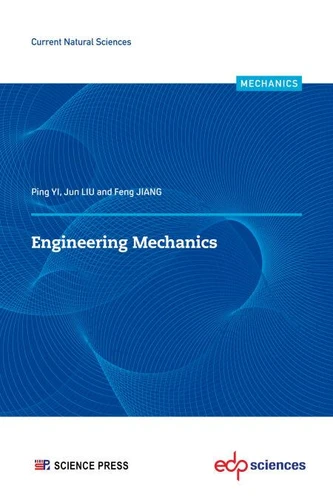Engineering Mechanics
Par : , ,Formats :
Disponible dans votre compte client Decitre ou Furet du Nord dès validation de votre commande. Le format PDF est :
- Compatible avec une lecture sur My Vivlio (smartphone, tablette, ordinateur)
- Compatible avec une lecture sur liseuses Vivlio
- Pour les liseuses autres que Vivlio, vous devez utiliser le logiciel Adobe Digital Edition. Non compatible avec la lecture sur les liseuses Kindle, Remarkable et Sony
 , qui est-ce ?
, qui est-ce ?Notre partenaire de plateforme de lecture numérique où vous retrouverez l'ensemble de vos ebooks gratuitement
Pour en savoir plus sur nos ebooks, consultez notre aide en ligne ici
- Nombre de pages474
- FormatPDF
- ISBN978-2-7598-2902-6
- EAN9782759829026
- Date de parution26/12/2022
- Protection num.Digital Watermarking
- Taille45 Mo
- Infos supplémentairespdf
- ÉditeurEDP Sciences
Résumé
Engineering mechanics provides the theories and methods of describing and predicting the state of equilibrium or accelerated motion of particles or rigid bodies under the action of forces. It consists of three parts: statics (chapters 1-5), kinematics (chapters 6 and 7) and kinetics (chapters 8-10) and it is basically corresponding to the course of "theoretical mechanics" in China. It is hoped that this book will help to develop in engineering students the correct understanding of the principles of mechanics and the ability to analyze and solve engineering problems using the principles.
This book can be used as a teaching material for civil engineering, hydraulic engineering, mechanical engineering, aerospace, transportation and other engineering majors in colleges and universities, and as a self-study book for relevant technical personnel.
This book can be used as a teaching material for civil engineering, hydraulic engineering, mechanical engineering, aerospace, transportation and other engineering majors in colleges and universities, and as a self-study book for relevant technical personnel.
Engineering mechanics provides the theories and methods of describing and predicting the state of equilibrium or accelerated motion of particles or rigid bodies under the action of forces. It consists of three parts: statics (chapters 1-5), kinematics (chapters 6 and 7) and kinetics (chapters 8-10) and it is basically corresponding to the course of "theoretical mechanics" in China. It is hoped that this book will help to develop in engineering students the correct understanding of the principles of mechanics and the ability to analyze and solve engineering problems using the principles.
This book can be used as a teaching material for civil engineering, hydraulic engineering, mechanical engineering, aerospace, transportation and other engineering majors in colleges and universities, and as a self-study book for relevant technical personnel.
This book can be used as a teaching material for civil engineering, hydraulic engineering, mechanical engineering, aerospace, transportation and other engineering majors in colleges and universities, and as a self-study book for relevant technical personnel.



